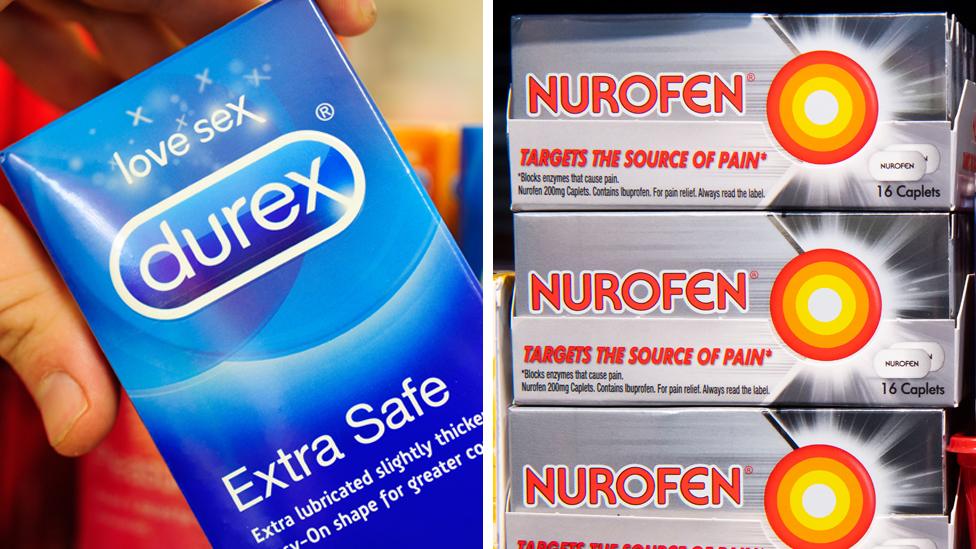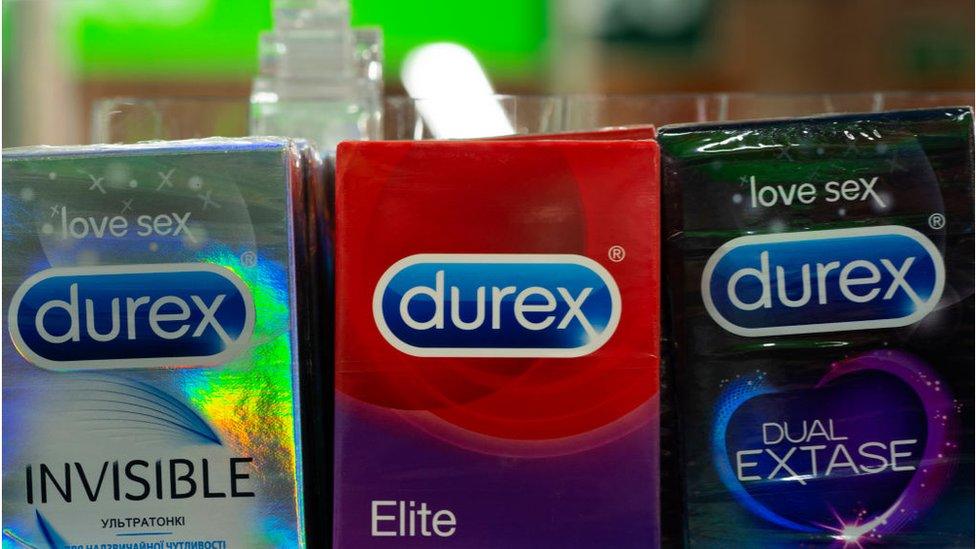Reckitt: More sex, fewer colds drive sales at Durex maker
- Published

Condom sales have jumped in countries including China where lockdowns are easing, says consumer goods giant Reckitt.
It reported a "double-digit" increase in Durex sales in the first quarter of 2021, compared with one year ago.
But demand for health products fell overall as fewer customers stocked up on cold and flu medicines.
Reckitt's boss pointed out that sales for Lysol and Dettol were strong as hygiene habits improved.
At the start of the pandemic last year, the firm said people were having less sex because of the coronavirus crisis, partly due to a "manifestation of anxiety".
Conversely, the company said sales of Durex jumped when social-distancing rules were relaxed in the summer.
In its nutrition division, which includes baby formula brand Enfa, sales in the first quarter fell 12.3%, but with hygiene sales up 21.1%, the overall sales tally for the first three months of the year stood at £3.5bn - down 1.1%.
Chief executive Laxman Narasimhan said: "Demand for Lysol and Dettol continues to be strong as consumers remain vigilant to the spread of the virus and see use of our products, and improved hygiene habits, as a way of protecting their health and regaining normality in their lives."
He said that the firm would continue to track changes in consumer behaviour and demand for different products at different stages of the pandemic.
The company reported a 16.4% decline in sales for health products like cold and flu relief products such as Nurofen or Strepsils. It estimated that cases of flu were down by as much as 90%, while consumers had already stocked up last year.
Mr Narasimhan added that in countries with few coronavirus cases and high vaccination rates, people have eased off on washing their hands or using hand sanitizers, although use was still higher than before the pandemic.
For example, sales of Dettol showed strong growth in India, which is currently dealing with soaring cases of Covid, but declined in China.
"Sexual wellness" products saw a big uptick in sales in countries like China too, as well as parts of the United States and Europe.
Return to 'normal'?
Bosses said they expect this to grow in other countries as lockdowns and social distancing measures lead to the opportunity for more people to use their products.
The results are an illustration of changes in spending habits as lockdown rules loosen.
On Tuesday market research firm Kantar said that UK shoppers are making more trips to supermarkets and buying less online as lockdown lifts and the vaccine rollout continues.
Its latest figures show that online supermarket sales growth has halved since the height of the pandemic, to 46%. Meanwhile, the number of trips to grocery stores rose by 4% month-on-month in the four weeks to 18 April.
Kantar said older shoppers accounted for much of the rise in footfall, with much of the over-65 community now vaccinated.
More than 33 million people in the UK have received at least one dose of a coronavirus vaccine - part of the biggest inoculation programme the country has ever launched.
Overall supermarket sales rose by 5.7% to £31.6 billion in the 12 weeks to 18 April, marking a slowdown in the rate of growth seen a year ago when shoppers panic-bought at the start of the crisis.
Fraser McKevitt, head of retail and consumer insight at Kantar, said: "While the market may fluctuate between growth and decline in the months ahead, depending on the year-on-year comparison being made, the fact that trip numbers are up and basket sizes down suggests that habits are slowly returning to normal."
Related topics
- Published9 March 2021

- Published30 April 2020
